China Insight
Anti-Black Racism Dominates Online Discussions over ‘Privileged’ Exchange Students in China
Controversy erupted when Jinan University allegedly ‘forced’ female students to accompany exchange students from Congo.
Published
8 years agoon
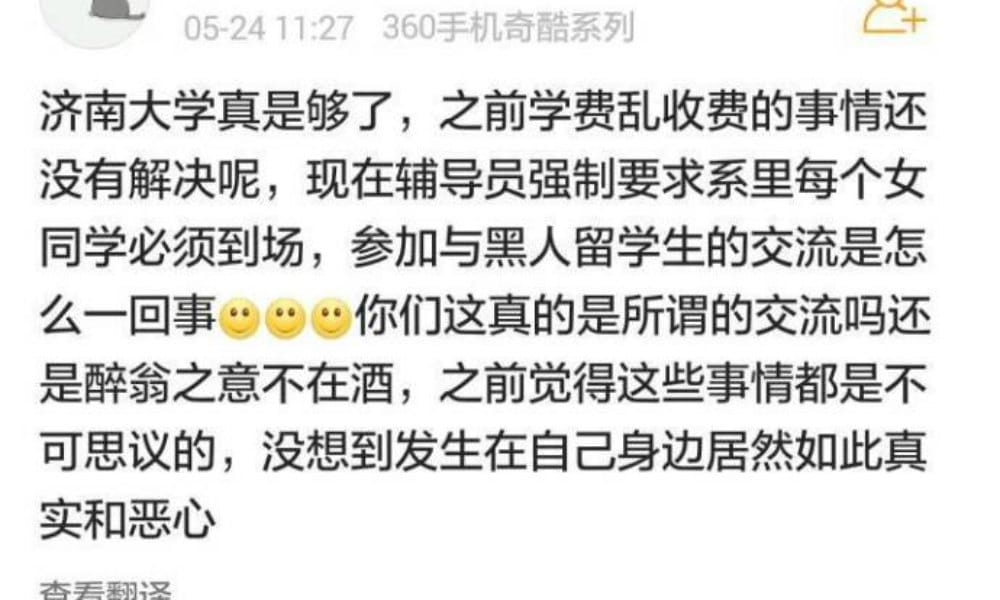
This week has seen various heated discussions on Chinese social media regarding the alleged privileged position of exchange students in the PRC. Anti-black racism is ubiquitous within these online discussions.
In the same week that a short video exposing the dorm disparity between Chinese and foreign students went viral, another issue has sparked controversy regarding overseas students in China.
This time, Chinese bloggers and social media users show their discontent with another type of alleged “internationalization” at Chinese universities – Jinan University in specific.
The controversy was triggered by a Weibo post published on June 24, in which a female netizen claimed that Jinan University was “forcing female students to participate in [cultural] ‘exchange’ activities with black exchange students.”
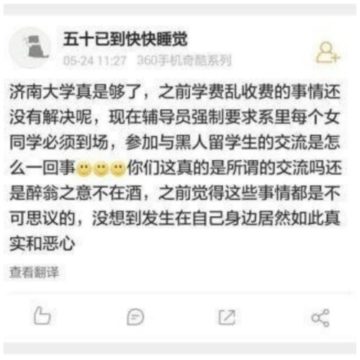
The post added fuel to recent ongoing discussions about the privileged position of foreign students, in which many Chinese social media users show their anger over exchange students’ relatively better dorm conditions, the scholarships they get, and other ways in which universities allegedly prioritize the comfort of international students over that of Chinese students.
This week, the alleged installment of new air-conditioning at the exchange students’ dorm at Jinan University – rather than an installment of air-conditioning at the Chinese students’ dorm – also sparked anger.
“Why don’t they send their own wives and daughters to ‘communicate’ with black students?”
What stands out in these online discussions is that, although there is a general anti-foreign trend, many netizens specifically talk about black students when they vent their anger, with waves of anti-black racism permeating these debates.
The claim that Chinese female students would be required to participate in on-campus activities with black exchange students triggered controversy on many online media platforms, from Sina Weibo to Zhihu.com and Tianya.
Some internet commentators suggested that it was improper for university staff to ‘assign’ Chinese girls to African students.
Photos of the programme arranged for the foreign students, in which Chinese students were to take part in, also leaked online.
“Not only does China educate these black devils for free, lets them eat and live for free on a scholarship, but also do they provide them with women. Just reincarnate me as a black person in my next life,” one commenter on messageboard Tianya writes.
“Why don’t they send their own wives and daughters to ‘communicate’ with black students?”, one Weibo user asked.
Jinan University responded to the online controversy on Weibo, writing:
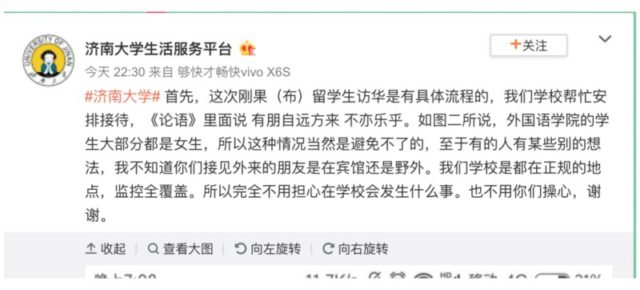
“Firstly, these exchange students from Congo visited China with a clear sequence of processes. Our school helped to arrange the welcoming of these visitors, as is said in The Analects of Confucius: ‘What a pleasure to have friends come from afar.’ (..) Since our students from the foreign language department are mostly female, these circumstances were unavoidable. (..). Our school is on a regular site and is all monitored. No one needs to worry that something would happen at our school.”
“Is this the People’s Republic of China, or People’s Republic of Africa?”
With the promotion of the One Belt One Road initiative and closer China-Africa relations, thousands of African students come to China on scholarships every year, pursuing undergraduate and graduate degrees subsidized by the government.
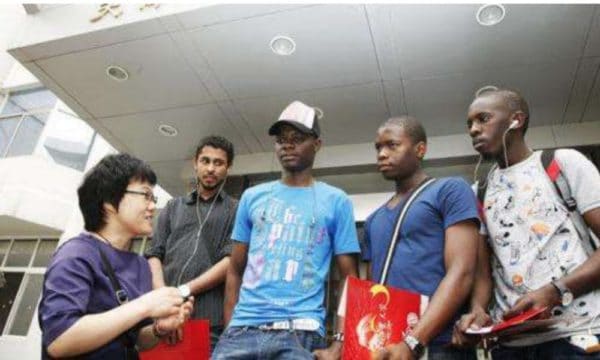
African exchange students at Hefei University (via Hushe.net).
According to Quartz Magazine, more Anglophone African students studied in China in 2017 than in the United States or the United Kingdom, which used to be their traditional destinations of choice.
The issues of the recent viral short movie – exposing the better living conditions of foreign students – together with the Jinan University controversies, have sparked off hundreds of comments on Weibo over the past week.
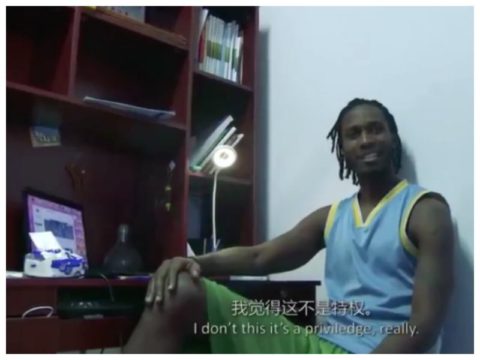
Exchange student featured in the short movie that went viral this week.
Saying they feel that Chinese students are being treated as “second-class citizens,” some netizens ask: “Is this the People’s Republic of China, or People’s Republic of Africa?”
“The Ministry of Education has become like an immigration office,” one Weibo user says: “It is damaging our country.”
Some blogs focusing on “black exchange students” in China say they bring HIV into the country, writing: “The Ministry of Education spends ten-thousands of yuan to let these low-class exchange students come to China, yet they haven’t had medical checks and bring in diseases.”
This is a recurring pattern on Weibo and other Chinese social media, where phrases such as “black devil go away” or “black monkey go back to Africa” are commonplace. Discrimination of Africans often comes with issues in which Chinese netizens themselves somehow feel marginalized or discriminated.
“The denigration and discrimination of black people is spreading like an epidemic.”
Online racism against Africans has been an ongoing issue on Weibo since the platform was launched in 2009. At the time, an essay about the racism against Chinese in Africa drew much attention. In 2013, Weibo was flooded by news of Chinese being killed in Ghana.
The existing idea that Chinese are looked down upon in Africa has allegedly worsened anti-African sentiments in China, although there are also those who already warned in 2013 that “the denigration and discrimination of black people [in Africa by the Chinese] is spreading like an epidemic.”
Throughout the years, multiple news stories concerning Africans have triggered waves of racist remarks. In “From Campus Racism to Cyber Racism,” scholar Cheng (2011) argues that anti-black racism in China has re-emerged with China’s deeper economic involvement in Africa, due to which large numbers of Chinese and Africans have come to work and study in each other’s countries.
Cheng writes that, although there already were waves of racism against Africans in the early post-Mao era, it has resurfaced over the last decade with the rise of China as a global power. Given that there are still many Chinese regarding Africans as “racially inferior,” “these people think it is wrong for Africans to create social problems in Chinese cities and impede China’s actions in Africa” (561).
“Chinese students often suffer discrimination when they go abroad. Why would they do the same to black students here?”
What is noteworthy is that anti-African sentiments on Weibo are mostly targeted at black men, not black women, and that their relations with Chinese women are strongly denounced. (Note: the Google image search results for ‘black African exchange student’ in Chinese (非洲黑人留学生) are very telling for what African exchange students are associated with online). It is perhaps for this reason that the Jinan incident especially ignited controversy.
But there are also those who resist racial stereotyping and discrimination.
Popular Weibo blogger Mai Tian (@麦田) wrote this week: “Lately, in the news feed of Weibo, I see more and more content that denounces Chinese girls being romantically involved with black men. This kind of content distributes racial discrimination, narrow-minded views, and a conceited stinkiness. It’s unbearable.”
“Chinese students often suffer discrimination when they go abroad. Why would they do the same to black students here?”, another commenter writes.
Others think the problem can be easily solved: “Just give Chinese students the same dorm conditions as other students and foreign students.”
For now, discussions are quieting down; most online threads and articles discussing this issue, including the response by Jinan University, have been taken offline by censors.
By Manya Koetse with contribution from Chauncey Jung
Follow @whatsonweibo
Reference
Cheng, Yinghong. 2011. “From Campus Racism to Cyber Racism: Discourse of Race and Chinese Nationalism.” The China Quarterly (207): 561-579.

Directly support Manya Koetse. By supporting this author you make future articles possible and help the maintenance and independence of this site. Donate directly through Paypal here. Also check out the What’s on Weibo donations page for donations through creditcard & WeChat and for more information.
Spotted a mistake or want to add something? Please let us know in comments below or email us.
©2018 Whatsonweibo. All rights reserved. Do not reproduce our content without permission – you can contact us at info@whatsonweibo.com.
Manya is the founder and editor-in-chief of What's on Weibo, offering independent analysis of social trends, online media, and digital culture in China for over a decade. Subscribe to gain access to content, including the Weibo Watch newsletter, which provides deeper insights into the China trends that matter. More about Manya at manyakoetse.com or follow on X.

China Brands, Marketing & Consumers
Signals: Hasan Piker’s China Trip & the Unexpected Journey of a Chinese School Uniform to Angola
Hasan Piker’s controversial China tour, a Chinese school uniform resurfaces in Africa, a new winter hotspot, why Chinese elites ‘run’ to Tokyo, and more.
Published
2 months agoon
November 21, 2025
🌊 Signals — Week 47 (2025)
Part of Eye on Digital China, Signals highlights slower trends and online currents behind the daily scroll. This edition was sent to paid subscribers — subscribe to receive the next issue in your inbox.
Welcome to another edition of Eye on Digital China. Different from the China Trend Watch (check the latest one here if you missed it), this edition, part of the new Signals series, is about the slower side of China’s social media: the recurring themes and underlying shifts that signal broader trends beyond the quick daily headlines. Together with the deeper dives, the three combined aim to give you clear updates and a fuller overview of what’s happening in China’s online conversations & digital spaces.
For the coming two weeks, I’ll be traveling from Beijing to Chongqing and beyond (more on that soon) so please bear with me if my posting frequency dips a little. I’ll be sure to pick it up again soon and will do my best to keep you updated along the way. In the meantime, if you know of a must-try hotpot in Chongqing, please do let me know.
In this newsletter: Hasan Piker’s controversial China tour, a Chinese school uniform in Angola, a new winter hotspot, discussions on what happens to your Wechat after you die, why Chinese elites rùn to Tokyo, and more. Let’s dive in.
- 💰 The richest woman in China, according to the latest list by Hurun Research Institute, is the “queen of pharmaceuticals” Zhong Huijuan (钟慧娟) who has accumulated 141 billion yuan (over 19 billion USD). Women account for over 22% of Chinese billionaires (those with more than 5 billion RMB), underscoring China’s globally leading position in producing wealthy female entrepreneurs.
- 🧩 What happens to your WeChat after you die? A user who registered for NetEase Music with a newly reassigned phone number unexpectedly gained access to the late singer Coco Lee’s (李玟) account, as the number had originally belonged to her. The incident has reignited debate over how digital accounts should be handled after death, prompting platforms like NetEase and Tencent to reconsider policies on long-inactive accounts and take stronger measures to protect them.
- 📱 Although millions of viewers swoon over micro-dramas with fantasy storylines where rich, powerful men win over the “girl next door” through money and status, Chinese regulators are now stepping in to curb exaggerated plots featuring the so-called “dominant CEO” (霸道总裁) archetype, signaling stricter oversight for the booming short drama market.
- ☕ A popular Beijing coffee chain calling itself “People’s Cafe” (人民咖啡馆), with its style and logo evoking nationalist visual nostalgia, has changed its name after facing criticism for building its brand – including pricey coffee and merchandise – on Mao era and state-media political connotations. The cafe is now ‘Yachao People’s Cafe’ (要潮人民咖啡馆).
- 👀 Parents were recently shocked to see erotic ads appear on the Chinese nursery rhymes and children’s learning app BabyBus (宝宝巴士), which is meant for kids ages 0–8. BabyBus has since apologized, but the incident has sparked discussions about how to keep children safe from such content.
- 🧧The 2026 holiday schedule has continued to be a big topic of conversation as it includes a 9-day long Spring Festival break (from February 15 to February 23), making it the longest Lunar New Year holiday on record. The move not only gives people more time for family reunions, but also gives a huge boost to the domestic travel industry.
Hasan Piker’s Chinese Tour & The US–China Content Honeymoon
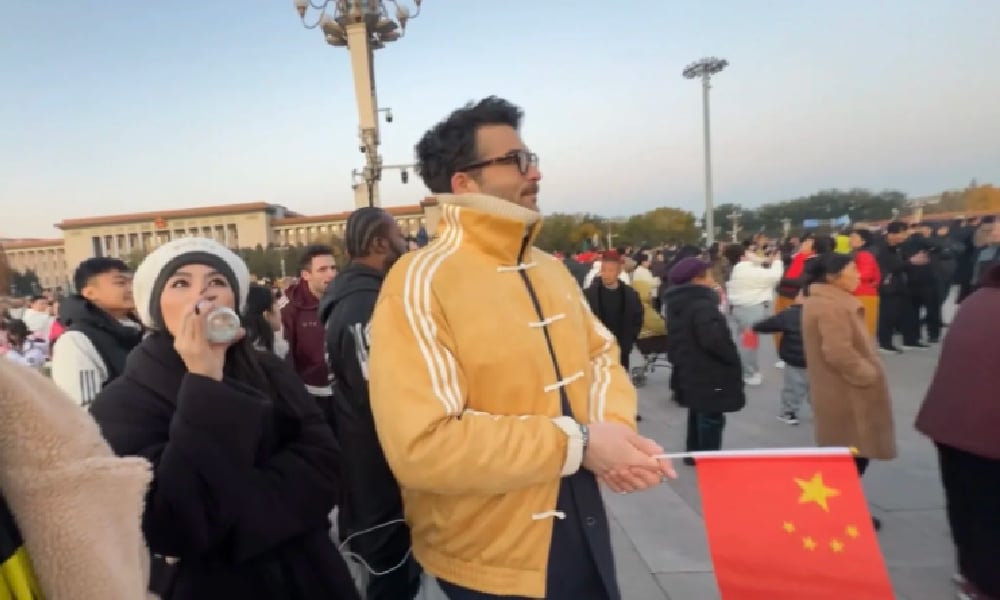
Livestreamer Hasan Piker during his visit to Tiananmen Square flag-rising ceremony.
It’s not time for the end-of-year overviews just yet – but I’ll already say that 2025 was the US–China ‘honeymoon’ year for content creation. It’s when China became “cool,” appealing, and eye-grabbing for young Western social media users, particularly Americans. The recent China trip of the prominent American online streamer Hasan Piker fits into that context.
This left-wing political commentator also known as ‘HasanAbi’ (3 million followers on Twitch, recently profiled by the New York Times) arrived in China for a two-week trip on November 11.

Piker screenshot from the interview with CGTN, published on CGTN.
His visit has been controversial on English-language social media, especially because Piker, known for his criticism of America (which he calls imperialist), has been overly praising China: calling himself “full Chinese,” waving the Chinese flag, joining state media outlet CGTN for an interview on China and the US, and gloating over a first-edition copy of Quotations from Chairman Mao (the Little Red Book). He portrays China as heavily misrepresented in the West and as a country the United States should learn from.
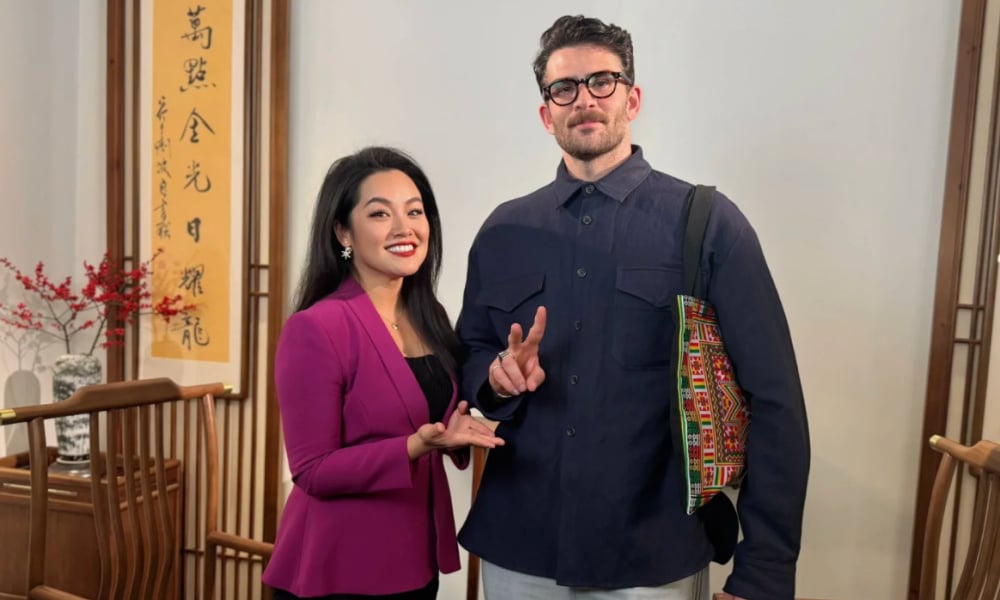
Hasan Piker did an interview with CGTN, posing with Li Jingjing 李菁菁.
During his livestreaming tour, Hasan, who is nicknamed “lemonbro” (柠檬哥) by Chinese netizens, also joined Chinese platforms Bilibili and Xiaohongshu.
But despite all the talk about Piker in the American online media sphere, online conversations, clicks, and views within China are underwhelming. As of now, he has around 24,000 followers on Bilibili, and he’s barely a topic of conversation on mainstream feeds.
Piker’s visit stands in stark contrast to that of American YouTuber IShowSpeed (Darren Watkins), who toured China in March. With lengthy livestreams from Beijing to Chongqing, his popularity exploded in China, where he came to be seen by many as a representative of cultural diplomacy.

IShowspeed in China, March 2025.
IShowSpeed’s success followed another peak moment in online US–China cultural exchange. In January 2025, waves of foreign TikTok users and popular creators migrated to the Chinese lifestyle app Xiaohongshu amid the looming TikTok ban.
Initially, the mass migration of American users to Xiaohongshu was a symbolic protest against Trump and US policies. In a playful act of political defiance, they downloaded Xiaohongshu to show they weren’t scared of government warnings about Chinese data collection. (For clarity: while TikTok is a made-in-China app, it is not accessible inside mainland China, where Douyin is the domestic version run by the same parent company).
The influx of foreigners — who were quickly nicknamed “TikTok refugees” — soon turned into a moment of cultural celebration. As American creators introduced themselves, Chinese users welcomed them warmly, eager to practice English and teach newcomers how to navigate the app. Discussions about language, culture, and societal differences flourished. Before long, “TikTok refugees” and “Xiaohongshu natives” were collaborating on homework assignments, swapping recipes, and bonding through humor. It was a rare moment of social media doing what we hope it can do: connect people, build bridges, and replace prejudice with curiosity.
Some of that same enthusiasm was also visible during IShowSpeed’s China tour. Despite the tour inevitably getting entangled with political and commercial interests, much of it was simply about an American boy swept up in the high energy of China’s vibrant cities and everything they offer.
Different from IShowSpeed, who is known for his meme-worthy online presence, Piker is primarily known for his radical political views. His China enthusiasm feels driven less by cultural curiosity and more by his critique of America.
Because of his stances — such as describing the US as a police state — it’s easy for Western critics to accuse him of hypocrisy in praising China, especially after a brief run-in with security police while livestreaming at Tiananmen Square.
Seen in broader context, Piker’s China trip reflects a shift in how China is used in American online discourse.
Before, it was Chinese ‘public intellectuals’ (公知) who praised the US as a ‘lighthouse country’ (灯塔国), a beacon of democracy, to indirectly critique China and promote a Western modernization model. Later, Chinese online influencers showcased their lives abroad to emphasize how much ‘brighter the moon’ was outside China.
In the post-Covid years, the current reversed: Western content creators, from TikTok influencers to political commentators, increasingly use China to make arguments that are fundamentally about America.
Between these cycles, authentic cultural curiosity gets pushed to the sidelines. The TikTok-refugee moment in early January may have been the closest we’ve come in years: a brief window where Chinese and American users met each other with curiosity, camaraderie, and creativity.
Hasan’s tour, in contrast, reflects a newer phase, one where China is increasingly used as a stage for Western political identity rather than a complex and diverse country to understand on its own terms. I think the honeymoon phase is over.
“Liu Sihan, Your School Uniform Ended Up in Angola”: China’s Second-Hand Clothing in Africa

A Chinese school uniform went viral after a Chinese social media user spotted it in Angola.
“Liu Sihan, your schooluniform is hot in Africa” (刘思涵你的校服在非洲火了) is a sentence that unexpectedly trended after a Chinese blogger named Xiao Le (小乐) shared a video of a schoolkid in Angola wearing a Chinese second-hand uniform from Qingdao Xushuilu Primary School, that had the nametag Liu Sihan on it.
The topic sparked discussions about what actually happens to clothing after it’s donated, and many people were surprised to learn how widely Chinese discarded clothing circulates in parts of Africa.
Liu Sihan’s mother, whose daughter is now a 9th grader in Qingdao, had previously donated the uniform to a community clothing donation box (社区旧衣回收箱) after Liu outgrew it. She intended it to help someone in need, never imagining it to travel all the way to Africa.
In light of this story, one netizen shared a video showing a local African market selling all kinds of Chinese school items, including backpacks, and people wearing clothing once belonging to workers for Chinese delivery platforms. “In Africa, you can see school uniforms from all parts of China, and even Meituan and Eleme outfits,” one blogger wrote.
When it comes to second-hand clothing trade, we know much more about Europe–Africa and US–Africa flows than about Chinese exports, and it seems there haven’t been many studies on this specific topic yet. Still, alongside China’s rapid economic transformations, the rise of fast fashion, and the fact that China is the world’s largest producer and consumer of textiles, the country now has an enormous abundance of second-hand clothing.
According to a 2023 study by Wu et al. (link), China still has a long way to go in sustainable clothing disposal. Around 40% of Chinese consumers either keep unwanted clothes at home or throw them away.
But there may be a shift underway. Donation options are expanding quickly, from government bins to brand programs, and from second-hand stores to online platforms that offer at-home pickup.

Chinese social media users posting images of school/work uniforms from China worn by Africans.
As awareness grows around the benefits of donating clothing (reducing waste, supporting sustainability, and the emotional satisfaction of giving), donation rates may rise significantly. The story of Liu Sihan’s uniform, which many found amusing, might even encourage more people to donate. And if that happens, scenes of African children (and adults) wearing Chinese-donated clothes may become much more common than they now are.
Laojunshan: New Hotspot in Cold Winter

Images from Xiaohongshu, 背包里的星子, 旅行定制师小漾
Go to Zibo for BBQ, go to Tianshui for malatang, go to Harbin for the Ice Festival, cycle to Kaifeng for soup dumplings, or head to Dunhuang to ride a camel — over recent years, a number of Chinese domestic destinations have turned into viral hotspots, boosted by online marketing initiatives and Xiaohongshu influencers.
This year, Laojunshan is among the places climbing the trending lists as a must-visit spot for its spectacular snow-covered landscapes that remind many of classical Chinese paintings. Laojunshan (老君山), a scenic mountain in Henan Province, is attracting more domestic tourists for winter excursions.
Xiaohongshu is filled with travel tips: how to get there from Luoyang station (by bus), and the best times of day to catch the snow in perfect light (7–9 AM or around 6–6:30 PM).
With Laojunshan, we see a familiar pattern: local tourism bureaus, state media, and influencers collectively driving new waves of visitors to the area, bringing crucial revenue to local industries during what would otherwise be slower winter months.
WeChat New Features & Hong Kong Police on Douyin
🟦 WeChat has been gradually rolling out a new feature that allows users to recall a batch of messages all at once, which saves you the frantic effort of deleting each message individually after realizing you sent them to the wrong group (or just regret a late-night rant). Many users are welcoming the update, along with another feature that lets you delete a contact without wiping the entire chat history. This is useful for anyone who wants to preserve evidence of what happened before cutting ties.
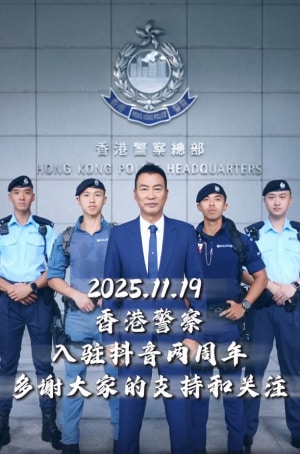
🟦The Hong Kong Police Force recently celebrated its two-year anniversary on Douyin (the Chinese version of TikTok), having accumulated nearly 5 million followers during that time. To mark the occasion, they invited actor Simon Yam to record a commemorative video for their channel (@香港警察). The presence of the Hong Kong Police on the Chinese app — and the approachable, meme-friendly way they’ve chosen to engage with younger mainland audiences — is yet another signal of Hong Kong institutions’ strategic alignment with mainland China’s digital infrastructure, a shift that has been gradually taking place. The anniversary video proved popular on Douyin, attracting thousands of likes and comments.
Why Chinese Elite Rùn to Japan (by ChinaTalk)
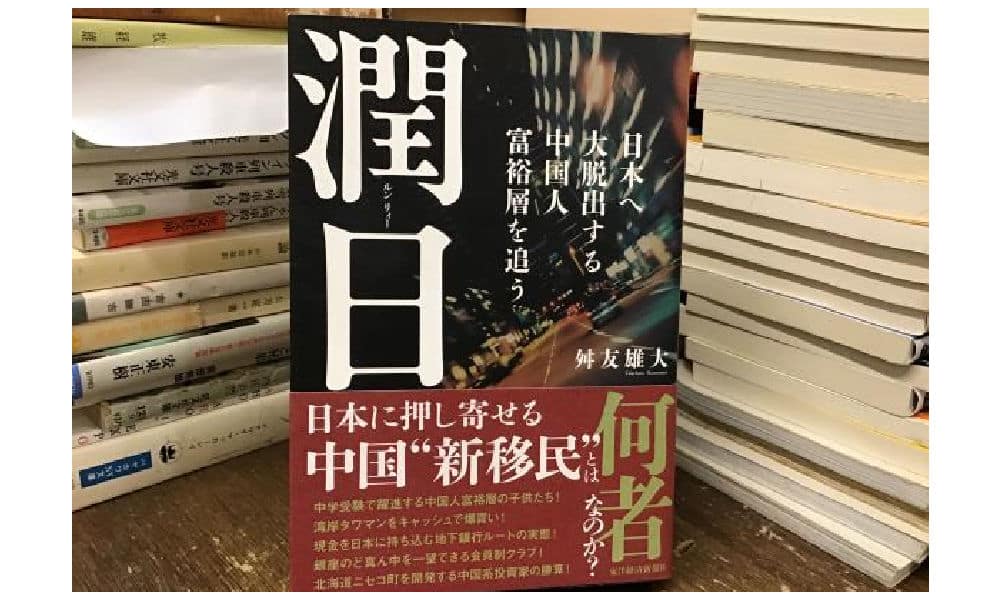
Over the past week, Japan has been trending every single day on Chinese social media in light of escalating bilateral tensions after Japanese PM Takaichi made remarks about Taiwan that China views as a direct military threat. The diplomatic freeze is triggering all kinds of trends, from rising anti-Japanese sentiment online and a ban on Japanese seafood imports to Chinese authorities warning citizens not to travel to Japan.
You’d think Chinese people would want to be anywhere but Japan right now — but the reality is far more nuanced.
In a recent feature in ChinaTalk, Jordan Schneider interviewed Japanese journalist & researcher Takehiro Masutomo (舛友雄大) who has just published a book about Japan’s new Chinese diaspora, explaining what draws Chinese dissidents, intellectuals, billionaires, and middle-class families to Tokyo.
The book is titled Run Ri: 潤日 Following the Footsteps of Elite Chinese Escaping to Japan (only available in Japanese and Traditional Chinese for now). (The word Rùn 润/潤, by the way, is Chinese online slang and meme expresses the desire to escape the country.)
A very interesting read on how Chinese communities are settling in Japan, a place they see as freer than Hong Kong and safer than the U.S., and one they’re surprisingly optimistic about — even more so than the Japanese themselves.
Thanks for reading this Eye on Digital China Signals. For fast-moving trends and deeper dives, keep an eye on the upcoming newsletters.
And if you just so happen to be reading this without a subscription and appreciate my work, consider joining to receive future issues straight in your inbox.
A small housekeeping note:
This Eye on Digital China newsletter is co-published for subscribers on both Substack and the main site. If you’re registered on both platforms, you’ll receive duplicate emails — so if that bothers you, please pick your preferred platform and unsubscribe from the other.
Many thanks to Miranda Barnes for helping curate some of the topics in this edition.
— Manya
Spotted an error or want to add something? Comment below or email me.
First-time commenters require manual approval.
©2025 Eye on Digital China / What’s on Weibo. Do not reproduce without permission —
contact info@whatsonweibo.com.
China Insight
“Jiangyou Bullying Incident”: From Online Outrage to Offline Protest
“You think we’re scared of you? It’s not like we haven’t been to jail before.”
Published
5 months agoon
August 6, 2025
These days have been filled with tension and anger in the city of Jiangyou (江油市), Sichuan, after a rare, large-scale protest broke out following public outrage over a severe bullying incident and how it was handled.
The bullying incident at the center of this story happened outside school premises in Mianyang on the afternoon of July 22. Footage of the assault, recorded by bystanders at the scene, began circulating widely online on August 2, sparking widespread outrage among concerned netizens, many of them worried parents.
The violent altercation involved three girls between the ages of 13 and 15 who ganged up on another minor, a 14-year-old girl named Lai (赖).
After Lai and a 15-year-old girl named Liu (刘) reportedly had a dispute, Liu gathered two of her friends—the 13-year-old also named Liu (刘) and a 14-year-old named Peng (彭)—to gang up on Lai.
The three underage girls lured Lai to an abandoned building, where they subjected her to hours of verbal and physical violence. The footage showed how they took turns in kicking, slapping, and pushing her.
At one point, after Lai said she would call the police, one of the bullies yelled: “You think we’re scared of you? It’s not like we haven’t been to jail before. I’ve been in more than ten times—it doesn’t even take 20 minutes to get out” (“你以为我们会怕你吗?又不是没进去过,我都进去十多次了,没二十分钟就出来了”).
That same night, the incident was reported to police. It took authorities until August 2 to bring in all involved parties for questioning, and a police report was issued on the morning of Monday, August 4.
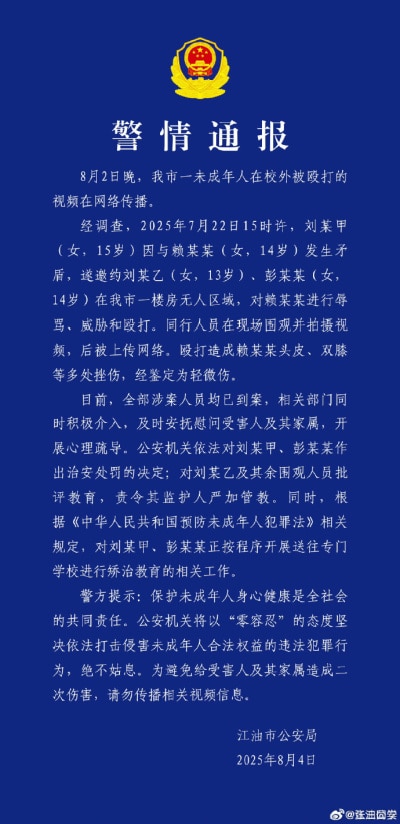
Police report by Jiangyou Public Security Bureau, confirming the details of the incident and the (legal) consequences for the attackers.
Two of the girls (the 15- and 14-year-old) were given administrative penalties and will be sent to a specialized correctional school. The younger Liu and other bystanders were formally reprimanded.
“Parents Speak Out for the Bullied Girl”
The way the incident was handled—not just the relatively late official report, but mostly the perceived lenient punishment—triggered anger online.
Many people who had seen the video responded emotionally and felt that the underage girls should be stripped of their rights to take their exams, and that the bullying incident should forever haunt them in the same way it will undoubtedly haunt their victim.
Especially the phrase “It’s not like I haven’t been taken in [to jail] before” struck a chord, as it showed just how calculated the bullies were—and how, by counting on the leniency of the Chinese judicial system for minors, they made the system complicit in their determination to turn those hours into a living hell for Lai.
China has been dealing with an epidemic of school violence for years. In 2016, Chinese netizens were already urging authorities to address the problem of extreme bullying in schools, partly because minors under the age of 16 rarely face criminal punishment for their actions.
Since 2021, children between the ages of 12 and 14 can be held criminally responsible for extreme and cruel cases resulting in death or disability—but their legal prosecution must first be approved by the Supreme People’s Procuratorate (SPP).
It has not done much to stop the violence.
Discussions around extreme bullying like this have repeatedly flared up over the years, such as in 2020, when a 15-year-old schoolboy named Yuan (袁) in Shaanxi was fatally beaten and buried by a group of minors.
Last year, a young boy named Wang Ziyao (王子耀) was killed by three classmates after suffering years of bullying. His body was found in a greenhouse just 100 meters from the home of one of the suspects, and the case shocked and enraged local residents.
But the problem is widespread among girls, too.
In 2016, we already reported on how so-called ‘campus violence videos’ (校园暴力视频) had become a concerning trend. In these kinds of videos—often showing multiple bullies beating up a single victim on camera—it’s not uncommon to see girls as the aggressors.
Girls often form cliques to gang up on a victim to show that they are in control or to gain popularity. They also tend to be more inclined than boys to make cruel jokes or stage pranks meant to embarrass or humiliate their target. This may partly explain why there seem to be more campus violence videos on Chinese social media showing girls bullying girls than boys bullying boys.
In the case of Lai, she appears to have been particularly vulnerable. One of her relatives posted online that her mother is deaf and mute, and her father allegedly is disabled. This fact may have contributed to why Lai was repeatedly targeted and bullied by the same group of girls, who reportedly took away her phone and socially isolated her at school.
In response to the incident, netizens started posting the hashtag “Parents Speak Up for the Bullied Girl” (“#家长们为被霸凌女孩发声#), not only to support Lai and her family, but to demand harsher punishments for school bullies and for stricter crackdown on this nationwide problem.
From Online Anger to Offline Protest
While many people spoke out for Lai online, hundreds also wanted to show up for her in person.
On August 4, dozens of people gathered in front of the Jiangyou Municipal Government building (江油市人民政府) to demand justice and support Lai’s parents, who had come to express their grievances to the authorities—at one point even bowing to the ground in a plea for justice to be served for their daughter.

Footage and images circulating on social media showing the parents of Lai, the victim, bowing on the ground to demand justice from authorities.
As the crowd grew larger, tensions escalated, eventually leading to clashes between protesters and police.
The arrests at the scene did little to ease the situation. As night fell, the mood grew increasingly grim, and some protesters began throwing objects at the police.
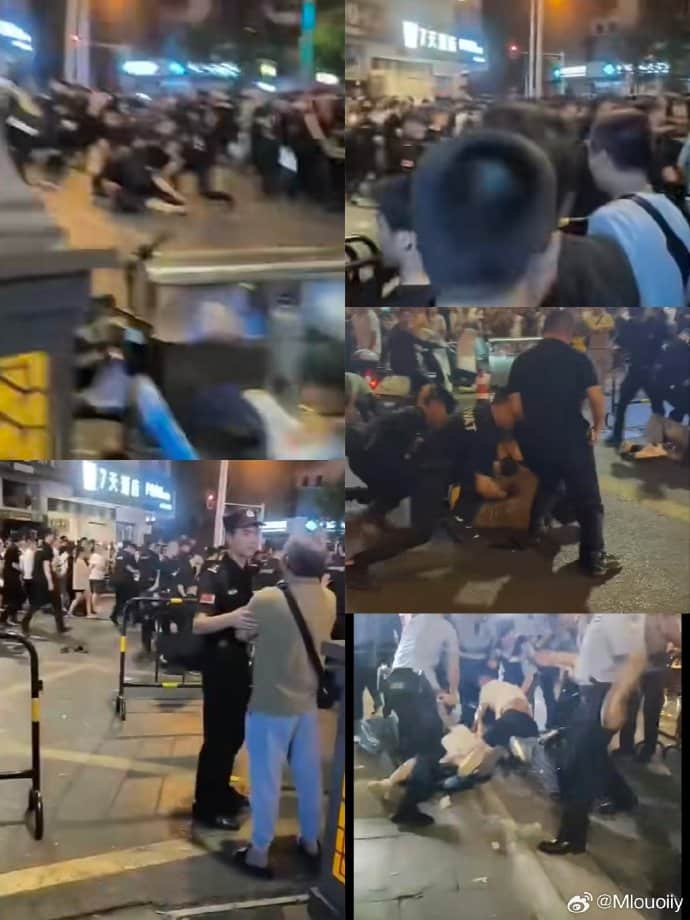
Images of the protest, posted on Weibo.
Near the east section of Shixian Road (诗仙路东段), more people gathered. Hundreds of individuals filming and livestreaming captured footage of the police crackdown—officers beating protesters, dragging them away, and deploying pepper spray.

Netizens’ digital artwork about the bullying incident, the parents’ grievances, and the public protest and its crackdown in Jiangyou. Shared by 程Clarence.
Although the protests briefly gained traction on social media and became a trending topic on Weibo, the search term was soon removed from the platform’s trending list.
Lasting Mental Scars
On Tuesday, August 5, several topics related to the Jiangyou bullying incident began trending again on Chinese social media.
On the short video app Kuaishou, a collective demand for justice surged to the number one spot, under the tag “A large number of Jiangyou parents demand justice for the victim” (江油大批家长为受害学生讨公道).
As of now, none of the perpetrators’ families have come forward to apologize.
As for Lai—according to the latest reports, she did not suffer serious physical injuries from the bullying incident, but according to her own parents, the mental scars will last. She will need continued mental health support and counseling going forward.
Although many posts about the incident and the ensuing protests have been taken offline, ‘Jiangyou’s Bullying Incident’ has already become one more case in the growing list of brutal school bullying incidents that have surfaced on Chinese social media in recent years. The heat of local anger may fade over time, but the rising number of such cases continues to fuel public frustration nationwide—especially if local authorities fail to do more to address and prevent school bullying.
“Not being able to protect our children, that’s a disgrace to our schools and the police,” one commenter wrote: “I want to thank all those mothers who have raised their voices for the bullied child. Each of us must say no to bullies, and we must do all we can to stop them. I hope the lawmakers agree.”
By Manya Koetse
(follow on X, LinkedIn, or Instagram)
Spotted a mistake or want to add something? Please let us know in comments below or email us. First-time commenters, please be patient – we will have to manually approve your comment before it appears.
©2025 Whatsonweibo. All rights reserved. Do not reproduce our content without permission – you can contact us at info@whatsonweibo.com.
Subscribe
Eye on Digital China is a reader-supported publication by
Manya Koetse (@manyapan) and powered by What’s on Weibo.
It offers independent analysis of China’s online culture, media, and social trends.
To receive the newsletter and support this work, consider
becoming a paid subscriber.

Get in touch
Have a tip, story lead, or book recommendation? Interested in contributing? For ideas, suggestions, or just a quick hello, reach out here.

The “Are You Dead Yet?” Phenomenon: How a Dark Satire Became China’s #1 Paid App

Trump, Taiwan & The Three-Body Problem: How Chinese Social Media Frames the US Strike on Venezuela

China’s 2025 Year in Review in 12 Phrases

China’s 10 Biggest Social Media Stories of 2025

Why Were 100,000 Pregnant Women’s Blood Samples Smuggled Out of China?

From Nobel Farewell to ‘VIP Toilets’: What’s Trending in China

China Trend Watch: Japan Tensions, Nexperia Fallout, Yunnan’s ‘Wild Child,’ & “Modern Opium”

Eye on Digital China: How Chinese Social Media Evolved from the Blog Era to the AI-driven Age

Signals: Hasan Piker’s China Trip & the Unexpected Journey of a Chinese School Uniform to Angola

Trump and Takaichi: The Unexpected Love Affair
Popular Reads
-

 China Arts & Entertainment6 months ago
China Arts & Entertainment6 months agoHidden Cameras and Taboo Topics: The Many Layers of the “Nanjing Sister Hong” Scandal
-

 China Insight9 months ago
China Insight9 months agoUnderstanding the Dr. Xiao Medical Scandal
-

 China Digital12 months ago
China Digital12 months ago“Dear Li Hua”: The TikTok/Xiaohongshu Honeymoon Explained
-

 China Insight5 months ago
China Insight5 months ago“Jiangyou Bullying Incident”: From Online Outrage to Offline Protest






Sotka Pujo
July 3, 2018 at 7:24 pm
So the jew communist are doing same thing they did in west.
Mickey D
July 7, 2018 at 8:28 pm
When I first found out about China’s infiltration of African countries, I believed part of the motivation was for Chinese to have someone to feel superior to, besides the Uighers.
When I first taught in China in 2009, I was very surprised to see how much Michael Jackson and Martin Luther King, Jr. were honored. And later I saw how the black atheletes like Michael Jordan, Kobe Bryant and Lebron James were adored! I can’t remember how many students had Kobe, James and Jordan for their English names. I even had a couple Obamas! But there is apparently a huge difference between black celebrities and black people they don’t know. When I play a song that featured a couple black musicians–really grooving–many students would laugh at how black they were. And some of the darker skinned students were nicknamed Obama. There were some that even laughed at how black Michael Jackson was in the short for “Thriller.” Girls especially, want to be as white as possible, and buy expensive whitening creams. But this article has shown me that the prejudice is deeper than color. It’s racism similar to what we see from lower class whites in the US. Because it’s common for foreign teachers to have better accommodations than Chinese teachers. Reason being, to keep the foreign teacher comfortable, reducing the culture shock, with the goal of the teacher staying a long time.
Uncle Tom
August 19, 2018 at 5:40 am
This article raises the issue of preferences. And that preferring any group over another does in fact amount to discrimination. In the United States it is appearing in public service and in university admissions as well as scholarships and “entitlement” programs. Yet every instance in which the party being discriminated against (in this instance Chinese university students) calls out the blatant discrimination against them, they are portrayed with random examples from unrelated incidents, as racist. These media tactics are abhorrent.